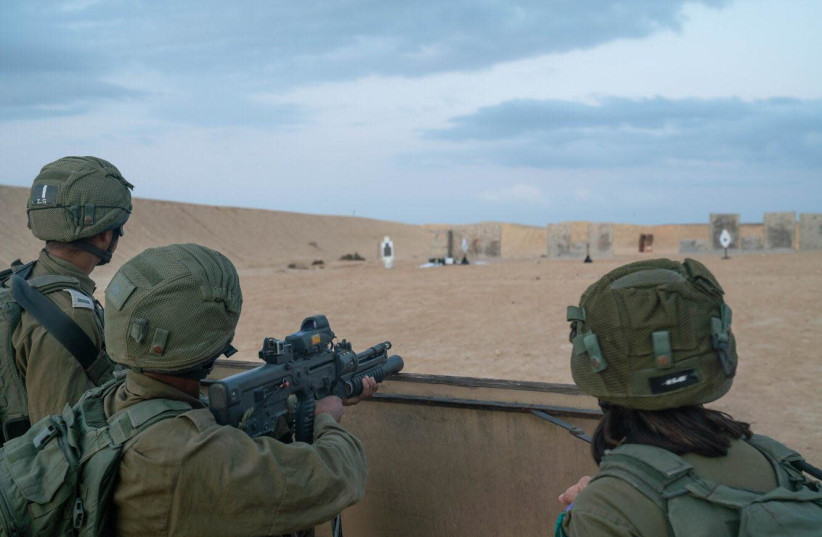Among the victims of Israel’s “Black Sabbath” massacre were some 300,000 Israeli Arabs—part of the 20% of the population that forms the Israeli Arab sector—who are residents of the Negev desert in southern Israel.
For more stories from The Media Line go to themedialine.org
On October 7, “all of us Negev residents,” said Mofed Abu Swelm, field coordinator at the Coexistence Forum, “woke up to a very harsh day with rockets. They [Hamas terrorists] entered the country, and there were people murdered from both the Bedouin community and the Jewish community,” he told The Media Line.
Foad Al-Zeadna is the director of the community center in Rahat, Israel’s largest Bedouin city. Al-Zeadna is experiencing Hamas’ barbarism firsthand, as four members of his family were abducted on October 7: a family member named Yousuf and his three children Bilal, Hamza, and Ayesha.
He told The Media Line that his family had been working at the barn in Kibbutz Holit, one of the communities stormed by Hamas that day. For more than three weeks, Al-Zeadna’s family members held the status of “missing,” and only on Sunday, the government pronounced them kidnapped.
“From that morning and until now, there has been no communication with them. To lose family is really hard. We hope that they will come back, that everyone will come back home healthy, and that this war ends,” he said.

'Hamas does not differentiate between blood and blood'
Danielle Cumpton, head of operations at Have You Seen the Horizon Lately, an NGO that promotes Arab-Jewish partnerships, said that the Bedouin community was affected just as much as Jews by Hamas’ terror attack. “During the Oct. 7 attack, it was clear that Hamas does not differentiate between blood and blood,” she told The Media Line.
This is not a war between Jews and Arabs, added Shir Nosatzki, the NGO’s director. “When Hamas attacked us, it did not only attack Jews. The group shot and killed many people from the Arab [sector],” she told The Media Line, adding that, so far, 24 people from the Bedouin community have been murdered by Hamas and another seven are kidnapped and being held in Gaza.
For this reason, members of both communities decided to join forces in an effort to help all those affected.
“Our destiny is shared.” This is the motto that brings people together from those communities to establish a joint relief center in Rahat to work for the resilience of the State of Israel.
“We established here in Rahat a shared relief center operated by Jews and Arabs whose goal is to help the affected people,” said Abu Swelm, adding that all the relief center’s donations come from Arabs and Jews and that all volunteers are from both communities.
Cumpton added that once a week, the volunteers arrive at the relief center to collect all the donations, package all of the equipment into little parcels, and distribute them to Jewish families in the Gaza envelope and to Arab families in Bedouin communities.
“Through the food basket, we also provide love and light, which is important these days,” noted Al-Zeadna.
'The fear is understandable, but we have to rise above that'
While the war has created some tension between the Jewish and Arab citizens of Israel, most of it is related to fear. Cumpton believes that this initiative aims to send a message of partnership.
“The fear is understandable, but we have to rise above that, and we have to maintain the partnership that we have in order to survive times like this,” she continued.
Abu Swelm is hopeful that the situation will improve. “Here in the Negev live Jews and Arabs; we have a shared destiny. All of us together will win, all of us together will come out of this.”
According to Nosatzki, “It is not a war between Jews and Arabs. It is a war between light and darkness, between people who want life and people who are terrorists,” she added.
But as the war continues, many Bedouin communities are in great danger as they, too, are targets of Hamas rockets, and most of them do not have bomb shelter protection.
About 100,000 Bedouins without bomb shelters
Nosatzki said that there are around 100,000 citizens in the Bedouin society who are living without bomb shelters.
With only 45 seconds to flee to safety when they hear the alarms, the citizens of Rahat and other surrounding towns in the area do not always have a place to run to protect themselves from the Hamas rockets.
Nosatzki spoke about a Bedouin woman who is a volunteer at the relief center, whose house was completely destroyed by a missile last week. “Now she is homeless,” Nosatzki pointed out.
Despite the difficult situation and the many complexities involved, these people want to send a message of peace and hope for the recovery of the State of Israel as a whole.
Al-Zeadna believes that the Bedouin community should be seen as partners of the rest of the population. “It is important that people see the Bedouin community as part of the solution and not as part of the problem. It is important that we live in peace, in love, and together. This is the message that we want to transmit,” he concluded.
The Jerusalem Post and OneFamily are working together to help support the victims of the Hamas massacre and the soldiers of Israel who have been drafted to ensure that it never happens again.
